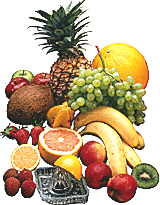Vegetarians
Healthier than Meat-Eaters?
 We often hear that vegetarians are healthier
than meat-eaters!
Research studies consistently show that people who consume a
diet high in meat and other foods of animal origin have a higher
mortality and morbidity rate (death and disease) as compared
to vegetarians. But why? We often hear that vegetarians are healthier
than meat-eaters!
Research studies consistently show that people who consume a
diet high in meat and other foods of animal origin have a higher
mortality and morbidity rate (death and disease) as compared
to vegetarians. But why?
Coronary Artery
Disease (CAD): When
excess dietary cholesterol is consumed, it accumulates on the
inside walls of coronary arteries (major arteries in the heart)
to form a "lesion" or "plaque." In addition
to cholesterol, plaque consists of saturated fat, also called
the "bad fat." As plaque continues to get thicker and
spreads outward, blood that normally flows freely through the
arteries becomes blocked. This condition is known as atherosclerosis
and eventually leads to arteriosclerosis. The end result is a
heart attack.
Plants don't
make cholesterol,
and therefore,
don't contribute to atherosclerosis. But plants do produce fat!
Corn contains 10% fat, peanuts 90%, soybeans 40%, olives 96%,
and avocados contain 90% fat. However, the fat produced by plants
is predominantly monounsaturated and polyunsaturated, the
good kinds of fat that help prevent CAD (with the exception of
coconuts containing 85% of mostly saturated fat). We need a small
amount of fat in our daily diet, but bad fat  should
be eliminated and replaced with good fat, nicely provided for
by Mother Nature. should
be eliminated and replaced with good fat, nicely provided for
by Mother Nature.
 Another
contributor to plaque is "hydrogenated" fat also referred to as "trans
fatty acids." The process of hydrogenation occurs when a
polyunsaturated liquid oil is pumped with hydrogen atoms to make
the product solid at room temperature. The most common example
of this process is the use of liquid corn oil to make soft tub
margarine. Although the finished product contains no cholesterol,
it's highly saturated and equally as unhealthy for your coronary
arteries. (For the chemists out there, monounsaturated and polyunsaturated
bonds become saturated by pumping in hydrogen atoms.) Another
contributor to plaque is "hydrogenated" fat also referred to as "trans
fatty acids." The process of hydrogenation occurs when a
polyunsaturated liquid oil is pumped with hydrogen atoms to make
the product solid at room temperature. The most common example
of this process is the use of liquid corn oil to make soft tub
margarine. Although the finished product contains no cholesterol,
it's highly saturated and equally as unhealthy for your coronary
arteries. (For the chemists out there, monounsaturated and polyunsaturated
bonds become saturated by pumping in hydrogen atoms.)
Stroke: The same process that
causes CAD and heart attacks can cause blockage of blood flowing
to the brain. Stroke can cause death or leave its victim with
partial or complete paralysis.
Osteoporosis:
Meat,
because it's high in sulphur, causes loss of calcium from bones. Over a span of 20 to
30 years, this loss can be significant leading to weak, brittle
bones that break easily. As with other nutrients, Mother Nature
provides us with protein from plant foods that are low in sulphur,
so it's not necessary to eat meat as a source of protein.
Gout is caused by the build-up
of uric acid, the end product of protein metabolism in the body.
Uric acid is deposited in joints beginning with the large toe
on one foot (Podagra) and can spread to the knees and upper leg.
Because meat, cheese, and eggs are a concentrated source of protein,
these foods contribute to gout while fruit, vegetables, and grains do not.
Obesity: When studying the typical
diet of obese persons, one factor that's clearly evident is that
their diet is overly abundant in meat, cheese, eggs, and fatty
foods, and lacking
in fruit and vegetables. Many
overweight people eat no fruit or vegetables at all - others
obtain a smidgeon from the lettuce and tomato on their Big Mac
or the olives on their double cheese and pepperoni pizza - and
still others prepare vegetable dishes with added fat, like greens
soaked in pork fat and a baked potato smothered in sour cream.
If you're trying to lose weight, the recommendation is to cut
down on consumption of fatty foods and consume more fruit, vegetables,
and grains.
Diabetes is a disorder of the
metabolism of food - the primary cause of Type II Diabetes is obesity. The combination of these
two conditions leads to development of other diseases like heart
disease, gout, blindness, high blood pressure, kidney disease,
osteoporosis, cancer, and stroke. Gangrene of the toes and feet,
common among diabetics, is due to poor blood circulation and
requires amputation of the infected limbs.
High Blood
Pressure:
The major concern of high blood pressure, or hypertension (HTN),
is that it can lead to a stroke. When HTN is caused by obesity,
weight reduction will bring blood pressure to within normal limits.
Cancer: Nutritionists have known
for a long time that a diet high in plant foods provided protection
from many kinds of cancer, especially colon cancer. We now know
that, in addition to fiber, phytochemicals, found only in plant foods, also contribute
to this protection. Click
Here
 to learn more about phytochemicals. to learn more about phytochemicals.
Osteoarthritis,
commonly
experienced by obese persons, is a condition that afflicts the
knee joints. When the knees are overloaded with too much body
weight, inflammation develops and walking becomes painfully difficult.
Osteoarthritis inevitably leads to a sedentary lifestyle and
additional weight gain. Gout is a form of arthritis.
High Blood
Lipids: This
condition is known as "high triglycerides" or "hypertriglyceridemia" and is directly linked
to dietary consumption of fat. High triglycerides are a risk
factor for heart disease. (Familial hypertriglyceridemia is a
genetic disorder, not caused by dietary intake, but sometimes
can be improved with dietary regulation.)
Lifestyle:
Research
shows that people who are concerned about what they eat are also
concerned about other factors affecting their health such as
smoking, drinking, and exercise. When comparing to meat-eaters,
vegetarians smoke less, exercise more, and drink less alcohol,
and therefore, tend to have an overall healthier lifestyle.
Note: All of
the diseases mentioned in this article can also be caused by
genetic and non-dietary related factors.
NUtritionTipS
-A high fat diet causes the liver to
produce excess cholesterol. Therefore, high fat foods that contain
"no cholesterol" still contribute to coronary artery
disease.
-When following a weight loss
diet that's high in saturated fat, total cholesterol may decrease
along with total body weight, however, LDL's increase, the major
contributors to heart disease.
-Coronary artery disease(CAD)
can sometimes be stopped or slowed down by changing dietary intake
to a low fat, low cholesterol diet.
Where do you get your nutrition
information? Most states now have licensure laws for Dietitians
and Nutritionists. Be sure your nutrition advisor is "Licensed"
by the State as a Licensed Dietitian (LD) or Licensed Nutritionist
(LN), or in states that don't have licensure laws, a Registered
Dietitian.
CarboH,
Inc.
Barbara Herondorf, L.D.
Home |
FAQ's |
Sample Menu |
Policies
More About CarboH |
Order CarboH |
Contact Us |
Letters
|


